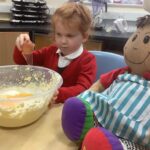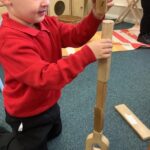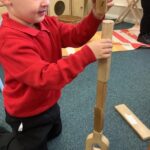The development of children’s spoken language underpins all seven areas of
learning and development. Children’s back-and-forth interactions from an early
age form the foundations for language and cognitive development. The number
and quality of the conversations they have with adults and peers throughout the
day in a language-rich environment is crucial. By commenting on what children
are interested in or doing, and echoing back what they say with new vocabulary
added, practitioners will build children’s language effectively. Reading frequently
to children, and engaging them actively in stories, non-fiction, rhymes and poems,
and then providing them with extensive opportunities to use and embed new
words in a range of contexts, will give children the opportunity to thrive. Through
conversation, story-telling and role play, where children share their ideas with
support and modelling from their teacher, and sensitive questioning that invites
them to elaborate, children become comfortable using a rich range of vocabulary
and language structures.
- Home
- Our School
- Key Info
- Curriculum
- Parents
- Pupils
- Our Classes
- SEND
- Introduction to SEN Information Report
- Our SEN Provision
- The kinds of SEN that are provided for:
- Our approach to teaching children & young people with SEND
- How we adapt the curriculum and learning environment for children & young people with SEN
- How we identify, assess and review children with special educational needs
- How children with SEN engage in all activities?
- How we evaluate the effectiveness of SEN Provision
- Support for Emotional & Social Development
- Looked After Children with SEND
- SEN Transition
- SEN Specialist Expertise
- Consulting with our SEN Pupils, Parents & Carers
- Compliments, Complaints & Feedback
- Key Policies
- Disability & Accessibility
- SEND Hub – School News and Support
- Contact
- News




